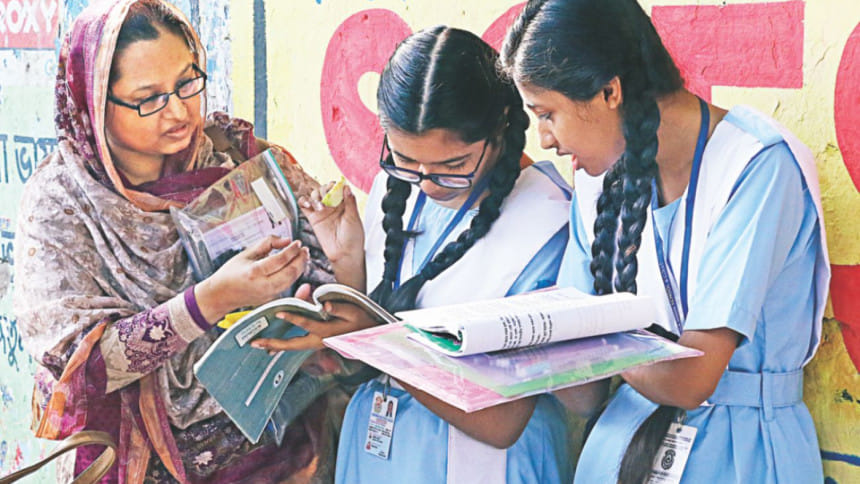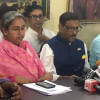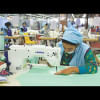Education lacks due attention

As the government had formulated National Education Policy immediately after coming to power in 2009, educationists started advocating for spending at least six percent of the GDP for education.
Nine years down the line, the budgetary allocation to this sector remains almost unchanged, leaving little scope for investment on quality education.
Finance Minister AMA Muhith yesterday proposed Tk 53,054 crore--about 2 percent of the GDP-- for the education sector for fiscal year 2018-19.
It is 11.41 percent of the total outlay.
"This is the second highest allocation for the next fiscal year for any particular sector," Muhith said in his budget speech. Despite growth in national budget, the share of the education sector in the total outlay has been decreasing over the last few years.
In fact, the percentage of total allocation does not match the figure nine years ago. In the revised budget of 2010-11, the figure was 14.3 percent. It was 12.6 percent of the total outlay in the outgoing fiscal year.
As the size of the national budget increased every year, the allocation for education rose too. However, education's share in the GDP and in the total spending declined over the years.
When it comes to quality education, the allocation is inadequate.
However, according to budget documents, the government is going to take some measures. One of those is to bring new educational institutions under the monthly pay order scheme. Finance ministry officials said around Tk 500 crore has been allocated for this purpose.
A large chunk of the education budget goes towards non-development spending--mainly for teachers' salaries. In the budget for next fiscal year, the proposed non-development expenditure is Tk 37,922 crore. Of the amount, around Tk 15,562 crore will be spent in paying salary and wages, according to documents.
In the last 10 years, the rise of allocation has been hovering around 10-12 percent, except once in 2016, when the jump was over 14 percent, according to budget documents.
The ratio of education budget to the GDP has been hovering around two percent over the last 15 years, which is lower than many other Asian countries.
Bangladesh committed in the Dakar Declaration and other global forums to spend six percent of the GDP or allocate at least 20 percent of the national budget for education. The Unesco also stipulates similar budgetary allocation for education.
Against this backdrop, educationists said the country's inflation continued to rise in the last decade when the education sector witnessed a rapid growth with an increased number of students, teachers and institutions. But the allocation didn't increase in proportion to the sector's growth, they added.
They also said Bangladesh should invest more in education, especially in the quality, if it wanted to change its future and achieve the goals set in the National Education Policy 2010 and Vision 2021.
"We are disappointed," said noted educationist Rasheda K Choudhury. Since this is an election year, there would be definitely some priority sectors like communication, infrastructure and energy. Education seemed to have taken a back seat, she said.
"In terms of amount, the allocation has increased. But if we look carefully the increase was in the operational expenditure," Rasheda, executive director of the Campaign for Popular Education, said.
The education sector of the country is so huge that the operational expenditures have to be bigger, she said. "But at the same time, we must invest more on quality education. We have to invest on teaching-learning quality, curriculum development and enhancing teacher's quality.
"We are dreaming of becoming a middle income country, but we are not giving due importance on human development capacity and skilled manpower. We have to invest on human development as well."
M Tamim, a professor of the Bangladesh University of Engineering and Technology, said the country had made significant progress in quantitative expansion of education.
"But now all our focus should be on quality," he said, adding that the allocation should rise by five to six percent from the existing one in order to leave enough to invest in skills development.
"We are expecting a GDP growth of eight to nine percent in future and it will all be done by the people. If we cannot produce skilled manpower, how will we ensure the growth?" Tamim, also a former adviser to a caretaker government, said the country's education focused on skills development at the entry levels.
But the focus should be changed now as the country is losing a huge amount of money every year in paying salaries to foreign employees in the middle and top posts, he said.

 For all latest news, follow The Daily Star's Google News channel.
For all latest news, follow The Daily Star's Google News channel. 








Comments